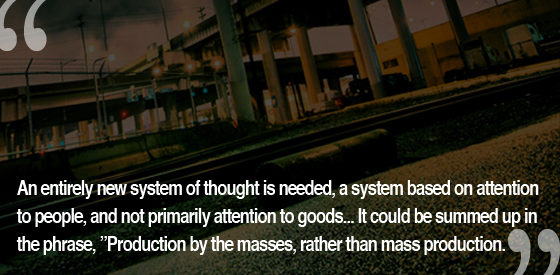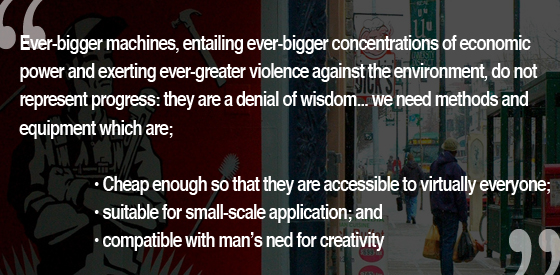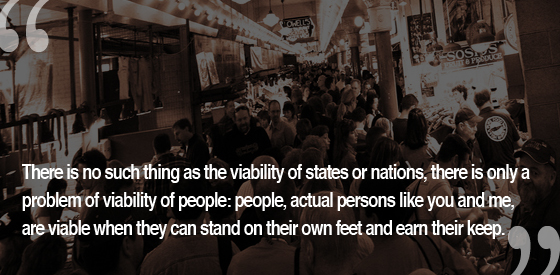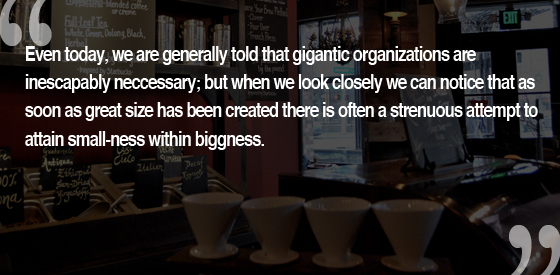“Since consumption is merely a means to human well-being, the aim should be to obtain the maximum of well-being with the minimum of consumption… Modern economics, on the other hand, considers consumption to be the sole end and purpose of all economic activity.” – E.F. Schumacher – Small is Beautiful
In 1974, E.F. Schumacher published “Small is Beautiful,” a collection of essays touting the virtues of smallness. He argued that we were too focused on increasing GDP and producing more goods, and in the process stomping on the environment, and even our own best interests. Though Schumacher’s ideas were largely discarded during the boom-times of the 90s and 00s, the combined effects of the recession and our increased environmental awareness seem to be bringing Schumacher’s ideas back to the forefront.
Most agree that our economy has been irreversibly changed by the great recession that we’re still slowly climbing out of. But how will the new economy look when it re-establishes itself? Will we continue to rely on the industrial food system, or will the local foods movement prove to be more than just a trend? Will we continue to support big box retail and it’s relentless drive for lower prices, or will we realize the value of shopping and manufacturing goods locally?
Capitol Hill has many businesses, organizations and individuals who are helping to define what comes next. Here are three people I spoke with for a better understanding of how their creations fit into Capitol Hill and the re-growth of the “Small is Beautiful” movement — Summer Robinson of Pilot Books, Ian Anderson of Zone Four and Scott Allison of Cherry Hill Urban Farm.
- Pilot Books: 219 Broadway E
- Zone Four: 1720 12th Ave
- Cherry Hill Urban Farm: 1127 15th Ave







…of how we can change the model of business, and I hope the Seattle community can embrace these micro businesses and help them survive. Thanks for sharing!
I love the Cherry Hill Urban Farm idea and I hope others are inspired by such a community and nature engaged endeavor.
As an apartment dweller it can be tough when we don’t generally have much of a yard, but thinking, as Scott says, outside the box, I would suggest people talk to their property owners/fellow residents about using even the small, unused spaces for compost boxes or chicken coops.
There is a similar project in the CD called something like the Union Street Farm (don’t quote me on that). You can bike or walk by it on 25th just South of Union street and get even more inspiration.
By the way, great work on this piece Cheesecake!
That one at 25th and Spring is just your standard P-Patch, nothing more. (not that there’s anything wrong with P-Patches, it’s just not a micro-business)
Actually, not that one, but just North of that, closer to Union there are a couple houses with a chicken coop and garden. Granted, I don’t think it is a business, just some very ambitious individuals, but it is very neat.
I’m already a big fan of Pilot Books, but I hadn’t heard of the other two places. That shot of the finished t-shirt is gorgeous… so sharp!
It is so great to see this post and to learn about some of the amazing small businesses that keep Capitol Hill so special. Keep ’em coming!
‘Small is beautiful’ represented our point of view when we decided to open a restaurant offering something different from a chain or a big corporations. I learned about Schumacher when I was in grad school thanks to a professor that I will never forget. It is nice to see Schumacher and his work mentioned here!
-Nic
and just to clarify (since we’re on the topic) Cherry Hill Urban Farm isn’t technically a micro-business either since it’s not a business at all. They’re producing mostly just for themselves and friends/ neighbors.
The maximum # of chickens allowed per standard property is 3, larger lots get incremental increases. Or you can have one goat and two chickens…there are regulations in the city regarding this since residents have been doing urban farming for many years. A Madrona household has 3 goats, I have three neighbors each with chickens down here in Columbia City. I had front and back yard vegetable and herb gardens in North Seattle stating in 1992 and was far from the first. I’m happy to see news coverage of the trend, but please don’t make it sound like this is new.
who said it was new?
If you listen to the video, he says it took being in Portland the last two years to inspire him and that people “up here” are starting to get interested in urban food production – not an exact quote. I guess my comment was directed more at Scott than at the blog.
Gotcha. yeah it was kind of funny because when I interviewed one of the guys who was there for the event, he was talking about how growing your own food is such a “Seattle Thing,” and then right after that Scott was saying it’s a Portland Thing.